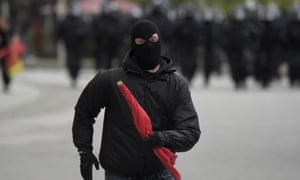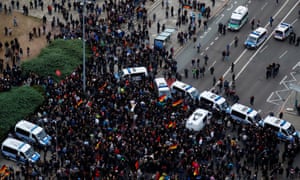In Chemnitz, anti-fascists stand up to the Nazi salutes of Germany's far right
در چمنیتز، ضد فاشیست ها در مقابل سلام دادن نازی ها
راست افراطی آلمان ایستاده اند
Far-right protesters do not have things their own way as counter marches emerge
معترضان راست افراطی نمیتونن چیزهائی رو که میخوان بهش برسن ، چرا که راهپیمائی
مخالفانشان مثل اجل ظاهر می شوند
https://www.theguardian.com/world/2018/sep/01/chemnitz-protests-germany-migration
A week after violent clashes that shook Germany and echoed around the world, demonstrators took to the streets of Chemnitz again on Saturday, for the latest round of a high-profile, high-stakes battle over the soul and future of their country.
Thousands of people, arms linked and chanting, marched down a street where a week ago far-right demonstrators performed Nazi salutes, shouted “foreigners out” and chased people they suspected of being refugees down the streets. There were fears of more violence this weekend after the same far-right groups called a second demonstration. But a substantial group on the Chemnitz boulevard yesterday came not to attack diversity, but to celebrate it.
“Say it loud, say it clear, refugees are welcome here,” they chanted loudly as they marched down the street to join thousands of others in a park at the centre of the city, for an event dubbed “Herz Statt Hetze”, “Heart not Hate”.
“We don’t want fascism in Germany, do we?” said Nadia Smirnova, who was holding the brightly colored flag of the 15th battalion of international volunteers, who fought with the Republican forces in the Spanish civil war against the fascist forces of Francisco Franco. “Things started here in 1933 and they shouldn’t start again. It was bad enough that a party, which is very nearly Nazi [in ideology] is represented in parliament, we don’t want that. It’s really bad news.”
It has been a week since the protests broke out in Chemnitz, in former East Germany, following the killing of a 35-year-old German man. An Iraqi and a Syrian were later arrested on suspicion of stabbing him during an altercation. Some 800 far-right protesters quickly mobilized in the streets as activists called on supporters to “defend” their country. The police were initially overwhelmed.
The next evening far-right groups, including “Pro Chemnitz”, mustered more than 6,000 protesters, while “Chemnitz Nazifrei” (Chemnitz free of Nazis) organized a counter-protest of about 1,500. But this time the numbers were different. Thousands of far-right protesters had gathered again, but so too had large crowds of their opponents and they were heading to the park. Dozens of police vans and officers – and a few streets – separated the two groups.
At the far-right gathering, around the city’s monument to Karl Marx, they chanted “We are the people”, a phrase once used to herald the end of the East German communist regime but since reclaimed by the far right.
The “people” don’t want to give their names, though. One man said that he fears to lose his job if he is identified as one of the protesters, but insisted he is not a Nazi.
“This can’t go on. People have to integrate,” he said. “If my Czech boss talks about migrants, it’s fine, but as a German, you are automatically a Nazi.” His compatriots nodded enthusiastically. “What is a Nazi anyway?” said another, who identified himself as a member of the neo-Nazi NPD party. “It can’t be that German children are unable to play in playgrounds anymore. We just want the criminals out.”
Protests organized by the far-right Alternative for Germany (AfD) and Pegida continued well past their official end time, leaving police in riot gear facing demonstrators, who chanted “resistance” in defiance.
But the standoff ended when dozens of protesters made their way to the vigil for the German-Cuban man whose killing sparked the violence.
As they gathered around the flowers and candles, one protester held up a photo of Daniel H. Speaking about him to the group, he called the 35-year-old “peaceful, honest, loyal and respectful,” which was greeted by applause and chants of: “it was murder”, before they broke into a rendition of the national anthem.
Several small skirmishes were reported throughout the day, but as people headed home, Saxony Police called via Twitter for people to remain peaceful, warning that officers would stay on the streets. Germans have been shocked by the intensity of the protests over the past week, although the area has long been known as a hotbed of far-right extremism. Nearby Dresden, also in Saxony, was the birthplace of the new far-right political group Pegida – its acronym in German stands for Patriotic Europeans Against the Islamisation of the West.
Werner Patzelt, the political scientist at the Technical University of Dresden, blames policies which he said had caused a sharp influx of people with roots outside Germany. In western German states, by contrast, migration rose more slowly, over a number of decades, he said.
“The feeling of east Germans is that arrogant west German policymaking imposes things on them that they really dislike, and migration, as it was relaunched in 2015, is a significant dimension of that,” he said. “It is resented.”
In 2015, at the height of Europe’s migrant crisis, the German chancellor, Angela Merkel, made the now-controversial claim “We’ll manage it”, as almost a million refugees arrived in the country seeking asylum. That was more than four times the number that arrived in 2014.
“It was not a mistake to show a human face of Germany, to be helpful to refugees, this was absolutely in order,” said Patzelt. “But to generalize it, as if everybody now could come to Germany and as if German society would have no follow-up problems with that, this was a big political mistake.”
Since Merkel’s decision to welcome refugees, anti-migrant sentiment in Germany has been on the rise. Last year the AfD made it into parliament for the first time and is now the major opposition party.
About a quarter of Saxons say that they would now vote in favor of the AfD, according to recent polls. However, many in Chemnitz reject the idea that their hometown is a racist place. “I would never have expected something like this to happen, so extreme, in our town,” said Thomas Böhme, at the “Heart not Hate” counter-protest.
A small group of refugees from Iraq and Syria had joined the same protest; they said they had experienced hatred and discrimination in their daily lives.
Since you’re here…
… we have a small favour to ask. More people are reading the Guardian than ever but advertising revenues across the media are falling fast. And unlike many news organizations, we haven’t put up a paywall – we want to keep our journalism as open as we can. So you can see why we need to ask for your help. The Guardian’s independent, investigative journalism takes a lot of time, money and hard work to produce. But we do it because we believe our perspective matters – because it might well be your perspective, too.
The Guardian is editorially independent, meaning we set our own agenda. Our journalism is free from commercial bias and not influenced by billionaire owners, politicians or shareholders. No one edits our Editor. No one steers our opinion. This is important because it enables us to give a voice to the voiceless, challenges the powerful and holds them to account. It’s what makes us different to so many others in the media, at a time when factual, honest reporting is critical.


No comments:
Post a Comment